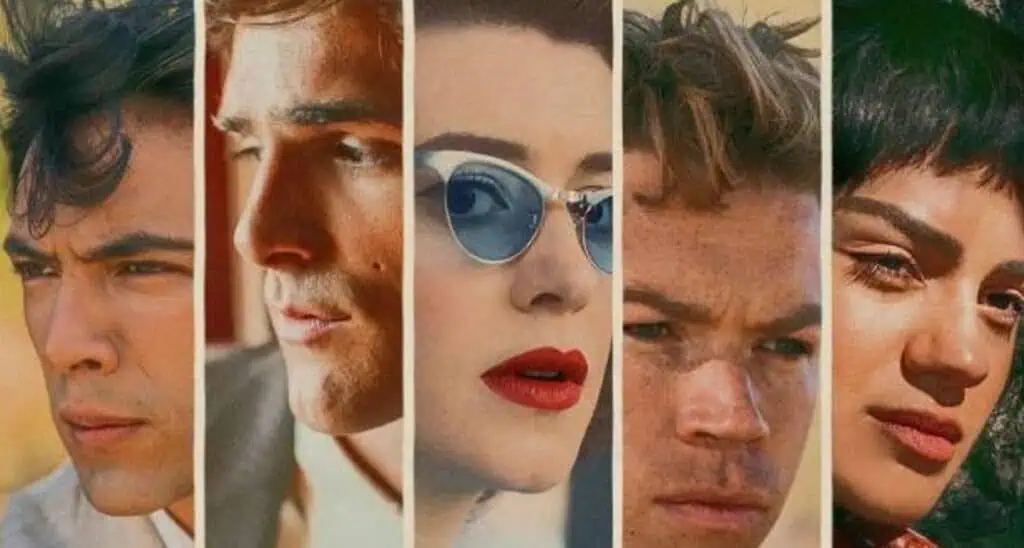On Swift Horses (2024), directed by Daniel Minahan and penned by Bryce Kass, adapts Shannon Pufahl’s 2019 novel into a visually stunning and emotionally complex romantic drama. Against the sun-kissed backdrop of 1950s California, it unfolds as a tale of longing, hidden identities, and daring emotional evolution.
Setting the Scene
At the heart of the story is Muriel (Daisy Edgar-Jones), a newcomer eager to begin a bright post-Korean War life with her newly returned husband, Lee (Will Poulter), in San Diego. Yet their peaceful domestic hopes are disrupted by the arrival of Lee’s enigmatic younger brother, Julius (Jacob Elordi). Julius seizes Las Vegas’s fevered nightlife as both escape and identity discovery, forming a secret romance with his co-worker Henry (Diego Calva), while Muriel embarks on a quiet rebellion of her own—betting on racehorses and igniting her own awakening through a growing bond with a neighbor, Sandra (Sasha Calle).
Performance & Character Dynamics
The chemistry between Edgar-Jones and Elordi is electric, effortless—and it pulses through the entire film, dragging the viewer into unspoken tensions and forbidden moments. Critics have lauded the ensemble’s capacity for subtle emotional expression; Jacob Elordi, especially, brings a tender intensity that some compared to a modern Montgomery Clift.
Lee, in contrast, stands for stability: the Korean War veteran eager to rebuild a conventional life. His grounded dreams highlight Muriel’s internal restlessness—an emotional divide rendered all the more poignant by Poulter’s understated performance.
Themes of Identity & Liberation
On Swift Horses delves into queerness, repression, and self-discovery in an era when such experiences were forced to remain in the shadows. Julius’s clandestine relationship with Henry plays out in neon-lit motels—a tender yet precarious reality in 1950s America. Muriel’s own journey arcs from dutiful wife to autonomous woman: her horse-racing winnings and connection with Sandra begin to reshape her life. These parallel arcs of liberation reach emotional clarity in the film’s ending—Muriel returns to her mother’s preserved home, reclaiming her sense of self, while Julius literally rides off into the sunrise toward Henry.
Visual Style & Pacing
Minahan leans heavily into aesthetic allure—every frame feels lovingly composed, as if lifted from a mid-century photo album. The cinematography drips with nostalgia: desert skylines, casino glow, and tension-filled domestic interiors. This visual elegance is both spellbinding and, at times, over-indulgent—some critics found the pacing languorous and the storytelling sprawling.
Critical Reflection
Reactions to On Swift Horses are many–faceted. Rotten Tomatoes notes that the film “capitalizes on a steadfast cast while grappling with contemplatively rich themes of society, sexuality, and morality to a mostly astute end”. Some critics, however, felt the film struggled to balance its multiple storylines and maintain narrative momentum, feeling more suited for a mini-series than a feature film. Yet even dissenters praise the emotional authenticity and restrained performances at its core.
Why It Matters
At its heart, On Swift Horses is a story about taking risks—emotional, social, personal. It’s about gambling on oneself amid a world insisting on conformity. For Muriel and Julius, the era’s repression becomes a combustible backdrop against which self-definition and daring love ignite.
Muriel’s awakening is especially resonant: she doesn’t thunderous reject her past; instead she reclaims it—quietly, firmly, by returning home, by seizing control. Julius’s final silhouette riding into sunrise isn’t just romantic—it’s a declaration, a refusal to stay hidden.
The film may polarize viewers with its slow burn, its visual luxuriance, and its loose narrative structure—but for those drawn to stories of quiet rebellion and beautiful, complicated human connection, it leaves a lingering mark.
On Swift Horses invites audiences on a deliberate, atmospheric ride through emotional risk-taking and identity-seeking. With powerful performers, lush visuals, and sensitive explorations of hidden love, the film stands as a compelling ode to the courage it takes to live one’s truth—even in the shadows of history.
Let me know if you’d like suggestions on section titles, tone adjustments, or quotes from characters to add more voice!

